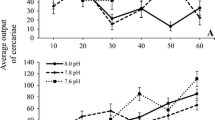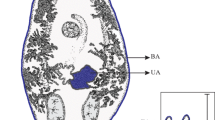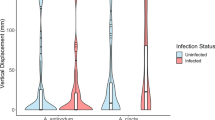Abstract
Ocean acidification is already having measurable impacts on marine ecosystems. Intraspecific variation in the responses of marine organisms to ocean acidification can reveal genetic differences in tolerance to low pH conditions and determine the potential for a species to adapt to a changing environment. This study tests for the existence of genetic variation in both the transmission success of the trematode Maritrema novaezealandense to its second intermediate amphipod host, Paracalliope novizealandiae, and the extent of parasite-induced mortality in that host, in response to decreasing pH. Eight parasite genotypes were tested in a custom-built ocean acidification simulation system, at 8.1 pH (current ocean conditions) and under conditions of 7.4 pH (worst-case scenario future prediction). The parasites had significantly higher infection success in the more acidic treatment, but there was no significant difference among genotypes in how infection success was affected by pH. In contrast, some parasite genotypes induced higher mortality in amphipods than other genotypes, but this genetic effect was also independent of pH. Overall, our results reveal no significant intergenotype variation in how the parasite responds to ocean acidification with respect to two key traits, infection success and parasite-induced host mortality, suggesting limited potential for adaptation in the face of acidifying conditions.



Similar content being viewed by others
References
Bates AE, Poulin R, Lamare MD (2010) Spatial variation in parasite-induced mortality in an amphipod: shore height versus exposure history. Oecologia 163:651–659
Berkhout BW, Lloyd MM, Poulin R, Studer A (2014) Variation among genotypes in responses to increasing temperature in a marine parasite: evolutionary potential in the face of global warming? Int J Parasitol 44:1019–1027
Bryan-Walker K, Leung TLF, Poulin R (2007) Local adaptation of immunity against a trematode parasite in marine amphipod populations. Mar Biol 152:687–695
Caldwell GS, Fitzer S, Gillespie CS, Pickavance G, Turnbull E, Bentley MG (2011) Ocean acidification takes sperm back in time. Invertebr Reprod Dev 55:217–221
Doney SC, Fabry VJ, Feely RA, Kleypas JA (2009) Ocean acidification: the other CO2 problem. Annu Rev Mar Sci 1:169–192
Doney SC, Ruckelshaus M, Duffy E, Barry JP, Chan F, English CA, Galindo HM, Grebmeier JM, Hollowed AB, Knowlton N, Polovina J, Rabalais NN, Sydeman WJ, Talley LD (2012) Climate change impacts on marine ecosystems. Annu Rev Mar Sci 4:11–37
Donnelly A, Caffara A, Kelleher CT, O’Niel BF, Diskin E, Plestsers A, Proctor H, Stirnemann R, O’Halloran J, Penuelas J, Kodkinson TR, Sparks TH (2012) Surviving in a warmer world: environmental and genetic responses. Clim Rese 53:245–262
Dupont S, Thorndyke MC (2009) Impact of CO2-driven ocean acidification on invertebrates early life-history—what we know, what we need to know and what we can do. Biogeosci Discuss 6:3109–3131
Feely RA, Doney SC, Cooley SR (2009) Ocean acidification: present conditions and future changes in a high-CO2 world. Oceanography 22:36–47
Field CB, Barros VR, Dokken DJ, Mach KJ, Mastrandrea MD, Bilir TE, Chatterjee M, Ebi KL, Estrada YO, Genova RC (eds) (2014) IPCC 2014: Climate change 2014: Impacts, adaptation, and vulnerability. Part A: Global and sectoral aspects. Contribution of working group ll to the fifth assessment report of the intergovernmental panel on climate change. Cambridge University Press, Cambridge
Fredensborg BL, Mouritsen KN, Poulin R (2004) Intensity-dependent mortality of Paracalliope novizealandiae (Amphipoda: Crustacea) infected by a trematode: experimental infections and field observations. J Exp Mar Biol Ecol 311:253–265
Fredensborg BL, Mouritsen KN, Poulin R (2005) Impact of trematodes on host survival and population density in the intertidal gastropod Zeacumantus subcarinatus. Mar Ecol Progr Ser 290:109–117
Fredensborg BL, Mouritsen KN, Poulin R (2006) Relating bird host distribution and spatial heterogeneity in trematode infections in an intertidal snail—from small to large scale. Mar Biol 149:275–283
Galaktionov KV, Dobrovolskij AA (2003) The biology and evolution of trematodes. Kluwer Academic Publishers, Dordrecht
Gazeau FPH, Gattuso JA, Dawber C, Pronker AE, Peene F, Penne J, Heip CHR, Middelburg JJ (2010) Effect of ocean acidification on the early life stages of the blue mussel Mytilus edulis. Biogeosciences 7:2051–2060
Harland H, MacLeod CD, Poulin R (2015) Non-linear effects of ocean acidification on the transmission of a marine intertidal parasite. Mar Ecol Prog Series. doi:10.3354/meps11416
Hoegh-Guldberg O, Bruno JF (2010) The impact of climate change on the world’s marine ecosystems. Science 328:1523–1528
Hofmann GE, Barry JP, Edmunds PJ, Gates RD, Hutchins DA, Klinger T, Sewell MA (2010) The effect of ocean acidification on calcifying organisms in marine ecosystems: an organisms-to-ecosystem perspective. Annu Rev Ecol Evol Syst 41:127–147
Keeney DB, Waters JM, Poulin R (2007) Clonal diversity of the marine trematode Maritrema novaezealandensis within intermediate hosts: the molecular ecology of parasite life cycles. Mol Ecol 16:431–439
Keeney DB, Bryan-Walker K, Khan N, King TM, Poulin R (2009) The influence of clonal diversity and intensity-dependence on trematode infections in an amphipod. Parasitology 136:339–348
Koehler AV, Poulin R (2012) Clone-specific immune reactions in a trematode-crustacean system. Parasitology 139:128–136
Koehler AV, Springer YP, Keeney DB, Poulin R (2011) Intra- and interclonal phenotypic and genetic variability of the trematode Maritrema novaezealandensis. Biol J Linn Soc 101:106–116
Koprivnikar J, Lim D, Fu C, Brack SHM (2010) Effects of temperature, salinity, and pH on the survival and activity of marine cercariae. Parasitol Res 106:1167–1177
Kroeker KJ, Kordas RL, Crim R, Hendriks IE, Ramajo L, Singh GS, Duarte CM, Gattuso J-P (2013) Impacts of ocean acidification on marine organisms: quantifying sensitivities and interaction with warming. Glob Change Biol 19:1884–1896
Lohbeck KT, Riebesell U, Reusch TBH (2012) Adaptive evolution of a key phytoplankton species to ocean acidification. Nature Geosci 5:346–351
MacLeod CD (2015) The effects of ocean acidification on host-parasite associations. Ph.D. thesis, University of Otago, Dunedin, New Zealand
MacLeod CD, Poulin R (2012) Host–parasite interactions: a litmus test for ocean acidification? Trends Parasitol 28:365–369
MacLeod CD, Poulin R (2015) Differential tolerances to ocean acidification by parasites that share the same host. Int J Parasitol 45:485–493
MacLeod CD, Doyle HL, Currie KI (2015) Maximising accuracy and minimising cost of a potentiometrically regulated ocean acidification simulation system. Biogeosciences 12:713–721
Martorelli SR, Fredensborg BL, Mouritsen KN, Poulin R (2004) Description and proposed life cycle of Maritrema novaezealandensis n. sp. (Microphallidae) parasitic in red-billed gulls, Larus novaehollandiae scopulinus, from Otago Harbor, South Island, New Zealand. J Parasitol 90:272–277
Merila J, Hendry AP (2014) Climate change, adaptation, and phenotypic plasticity: the problem and the evidence. Evol Appl 7:1–14
Minchella DJ (1985) Host life-history variation in response to parasitism. Parasitology 90:205–216
Mouritsen KN, Poulin R (2002) Parasitism, community structure and biodiversity in intertidal ecosystems. Parasitology 124:S101–S117
Orr JC, Fabry VJ, Aumont O, Bopp L, Doney SC, Feely RA, Gnanadesikan A, Gruber N, Ishida A, Joos F, Key RM, Lindsay K, Maier-Reimer E, Matear R, Monfray P, Mouchet A, Najjar RG, Plattner G, Rodgers KB, Sabine CL, Sarmiento JL, Schlitzer R, Slater RD, Totterdell IJ, Weirig M, Yamanaka Y, Yool A (2005) Anthropogenic ocean acidification over the twenty-first century and its impact on calcifying organisms. Nature 437:681–686
R Core Team (2014) R: A language and environment for statistical computing. Vienna, Austria. R Foundation for Statistical Computing. http://www.R-project.org/
Raven J (2005) Ocean acidification due to increasing atmospheric carbon dioxide. Policy Document 12/05. The Royal Society, London
Reusch TB (2014) Climate change in the oceans: evolutionary versus phenotypically plastic responses of marine animals and plants. Evol Appl 7:104–122
Schlegel P, Havenhand JN, Gillings MR, Williamson JE (2012) Individual variability in reproductive success determines winners and losers under ocean acidification: a case study with sea urchins. PLoS ONE 7:e53118
Studer A, Poulin R (2014) Analysis of trait mean and variability versus temperature in trematode cercariae: is there scope for adaptation to global warming? Int J Parasitol 44:403–413
Wolinska J, King KC (2009) Environment can alter selection in host-parasite interactions. Trends Parasitol 25:236–244
Acknowledgements
We thank Sarah, Tony, and Jack Harland for field assistance; Murray Mackenzie for technical support; and the Otago University Parasitology Group for advice and logistical assistance.
Author information
Authors and Affiliations
Corresponding author
Additional information
Responsible Editor: T. Reusch.
Reviewed by E. Ricevuto and an undisclosed expert.
Rights and permissions
About this article
Cite this article
Harland, H., MacLeod, C.D. & Poulin, R. Lack of genetic variation in the response of a trematode parasite to ocean acidification. Mar Biol 163, 1 (2016). https://doi.org/10.1007/s00227-015-2782-x
Received:
Accepted:
Published:
DOI: https://doi.org/10.1007/s00227-015-2782-x




